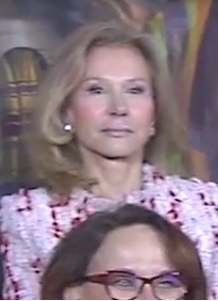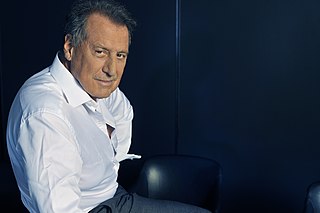
Ferrovial, S.A., previously Grupo Ferrovial, is a Spanish multinational company that operates in the infrastructure sector for transportation and mobility with four divisions: Highways, Airports, Construction, and Mobility and Energy Infrastructure. The Highway sector develops, finances, and operates tolls on highways such as the 407 ETR, the North Tarrant Express, the LBJ Express, Euroscut Azores, I-66, I-77, NTE35W, and Ausol I. The Airports sector operates at Heathrow, Glasgow, Aberdeen, and Southampton. The Construction business designs and carries out public and private works such as roads, highways, airports, and buildings. The Mobility and Energy Infrastructure Department is responsible for managing renewable energy, sustainable mobility, and circular economy projects. Ferrovial is present in more than 20 countries where its business lines operate.

Alicia Koplowitz y Romero de Juseu, 7th Marchioness of Bellavista, GE is a Spanish business magnate and noblewoman. When her father died, she and her sister inherited Fomento de Construcciones y Contratas, S.A. (CYCSA), a company founded by her father. She then sold her part of the company to her sister and created one of the largest family offices in Europe, called Omega Capital.

Edificio de Las Cariátides is a building in the Spanish capital of Madrid built by Spanish architect, Antonio Palacios. The building was later the head office of the Central Bank and later of the Santander Bank. As of 2006 it is the headquarters of the Instituto Cervantes.

ACS, Actividades de Construcción y Servicios, S.A. is a Spanish company dedicated to civil and engineering construction, all types services and telecommunications. It is one of the leading construction companies in the world, with projects in many countries around the world. The company was founded in 1997 through the merger of OCP Construcciones, S.A. and Ginés Navarro Construcciones, S.A. The group has a presence in Germany, India, Brazil, Chile, Morocco and Australia. The headquarters are in Madrid and the chairman is Florentino Pérez. Listed on the Bolsa de Madrid, the company's shares form part of the IBEX 35 stock market index.

Metrovacesa S.A. is a major Spanish property company, headquartered in Madrid, which was the largest publicly traded real estate developer in the Eurozone. The company is primarily focused on the leasing of a range of property in France and Spain, which comprises around 80% of its portfolio.
Alfonso Cortina de Alcocer was a Spanish businessman. He was chairman and chief executive officer of Repsol YPF, Spain's largest oil and gas group.

Unión Fenosa, S.A. was, until its acquisition by Gas Natural in 2009, a large Spanish company dedicated to the production and distribution of gas and electricity.
Alberto Alcocer y Ribacoba (1886–1957) was a Spanish politician.
Alberto Cortina de Alcocer is a Spanish businessman. Through his holding Percacer, he is co-owner, with his cousin Alberto Alcocer, of Alcor Holding, the owner of 12.5% of Grupo ACS, the biggest construction company in the world by sales with 2014 revenues of US$50b, and of 21% of Ence, the largest paper pulp and biomass energy company in Europe. He has appeared several years in Forbes List of Billionaires with US$1.4 billion.
Urbanor is a Spanish society. It constructed the KIO Towers of the Plaza de Castilla, in Madrid. It became one of the major economic scandals of the 1980s in Spain.

Jorge Horacio Brito was an Argentine banker and businessman. He was the CEO of Argentina's largest bank, Banco Macro. He was also the president and chairman of the Argentine Banking Association (ADEBA) from 2003 to 2016.
The Banco Pichincha is the largest private-sector bank in Ecuador, by capitalization and by number of depositors. It is the primary bank of the Pichincha Group, a business group that includes the companies associated with the bank and businesses related to Fidel Egas Grijalva and his family, which include Diners Club of Ecuador, Picaval and Teleamazonas.
Carlos Ardila Lülle was a Colombian entrepreneur and the founder and head of the Organización Ardila Lülle, a major Colombian conglomerate which controls companies such as RCN TV, the Postobon soft drink, and the Atlético Nacional football team. His estate's net worth is estimated at over $1.8 billion U.S. dollars.

Cousins Properties Incorporated is a publicly traded real estate investment trust (REIT) that invests in office buildings in Atlanta, Charlotte, Austin, Phoenix, Tampa, and Chapel Hill, North Carolina. The company has developed notable properties including CNN Center, Omni Coliseum, 191 Peachtree Tower, and Emory Point in Atlanta.

Pedro Cortina y Mauri was a Spanish politician and diplomat who served as the last Minister of Foreign Affairs under Francisco Franco between 1970 and 1975 and the first one with democracy until 1980. He had been Ambassador to France. He is the father of the famous businessmen Alfonso and Alberto Cortina. His wife died in 1976.

Alfredo Sáenz Abad is a Spanish businessman who was the CEO and Vice-Chairman of the Spanish bank Santander Group, the largest bank in the Eurozone and one of the largest banks in the world in terms of market capitalisation. He obtained his degree in Law from the University of Valladolid, and in Economics from the Universidad de Deusto, Bilbao.
Grupo Breca, also known as Grupo Brescia, is a Peruvian business conglomerate founded more than 130 years ago with operations in Peru and other countries in Latin America. Fortunato Brescia and his wife, Mrs. María Catalina Cafferata, are the group's founders. Their last names Brescia and Cafferata gave rise to the "Breca" brand, which reflects the memory of its founders.
Pedro Jose López Jiménez is a Spanish businessman, and the vice chairman of Real Madrid football club since 2009.

Luis Lacasa Navarro was a Spanish architect. His work in Spain and Paris before and during the Spanish Civil War (1936–39) was rationalist and functional. He is best known as co-designer of the Spanish Pavilion at the 1937 Paris Exposition, a work designed to showcase the modern legitimacy of the embattled Spanish Republic. After the war he went into exile in the Soviet Union.
Mario Conde. Los días de gloria is a two-part Spanish television miniseries. It is an adaptation of the Mario Conde's memoir Los días de gloria, portraying the 1993 intervention of Banesto. Directed by Salvador Calvo and starring Daniel Grao in the leading role, it aired in 2013 on Telecinco.










